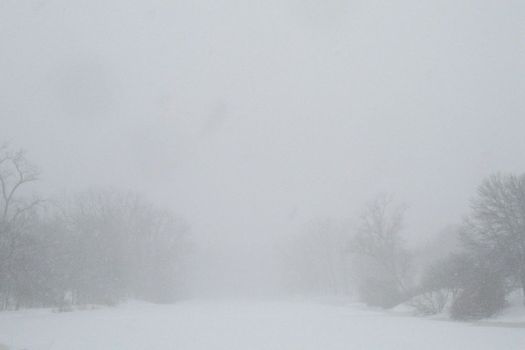Why is this a "blizzard" and not just a big snowstorm?

Visibility: low.
In most winters around here, we get at least a few big snowstorms, with a foot or more of snow. But they're not blizzards.
This week's storm? It's been tagged as a blizzard.
So... why is that?
The meteorological definition
Here are the requirements for a blizzard designation, per the National Weather Service:
A blizzard means that the following conditions are expected to prevail for a period of 3 hours or longer:
+ Sustained wind or frequent gusts to 35 miles an hour or greater; and
+ Considerable falling and/or blowing snow (i.e., reducing visibility frequently to less than 1/4 mile)
So the official designation isn't directly related to the amount of snow -- it's the combination of snow and wind together.
Etymology
That roots of the word (probably) stretch back to a place where winter tends to blow snow around quite a bit -- the American Midwest, specifically Iowa. From a post at Grammarphobia:
In an article published in February 1928, [Columbia University etymologist Allen Walker] Read says the earliest example of the usage he found was from the April 23, 1870, issue of the Northern Vindicator, a newspaper in Estherville serving Emmet County in northwest Iowa. (Someone should write an article about the names of small-town newspapers.)
That issue of the Vindicator debunked a "glowing account" in another newspaper, the Algona Upper Des Moines, that an Emmet County resident was endangered by a severe storm that had struck the Midwest on March 14-16, 1870:
"Campbell has had too much experience with northwestern 'blizards' to be caught in such a trap, in order to make sensational paragraphs for the Upper Des Moines."
A week later, on April 30, 1870, the Vindicator spelled "blizzard" with a double "z." Under the headline "Man Frozen at Okoboji, Iowa," an article says:
"Dr. Ballard who has just returned from a visit to the unfortunate victim of the March 'blizzard' reports that his patient is rapidly improving."
In both of these articles, the word is enclosed in quotation marks, suggesting that the usage was relatively new or considered colloquial.
The word precedes its usage in reference to weather. It originally was used to describe an outburst of some sort. Writes etymologist and linguist Anatoly Liberman in a blog post for Oxford University Press:
Despite the "origin unknown" stigma attached to blizzard, most researchers (and I mean researchers, not the authors of fanciful or folk etymological hypotheses) have offered similar derivations of our word. The original sense of blizzard must have been "a violent outburst," and bluster immediately comes to mind as a word of nearly the same sound shape and meaning. The groups bl- and b...l render various sound effects: consider babble, blob, burble, bubble, bobolink (a bird's name), and blow among others. Presumably, bluster and bliz(z) belonged to that group. Such words may never acquire broader meanings, but a metaphor occasionally gives them greater exposure. For example, buzz, to quote the OED, means "to make a sibilant humming sound" (oh, the aptness and beauty of such definitions!). The appearance of the noun buzzword allowed buzz to increases its scope of application, while the polite advice to an importune person to buzz off weakened its ties with sibilant flies and mosquitoes still further. Cattle running away from the swarms of buzzing horseflies were called bisig in the old language; this is the most likely origin of the adjective busy and its Dutch cognate bezig (originally "incessantly occupied": compare busybody). Blizz, like buzz, must have existed on the outskirts of spoken English for an indefinite period of time. To be sure, we cannot know when it arose.
As Liberman notes the word ended up being used to describe anything with great quickness -- a gunshot, or even a strong drink.
And the Oxford English Dictionary describes its origin as "more or less onomatopœic."
Stay warm as the snow blizzes about.
... said KGB about Drawing: What's something that brought you joy this year?